Terrill Welch by herself - Issue #2 The Coziest of Cozy Season
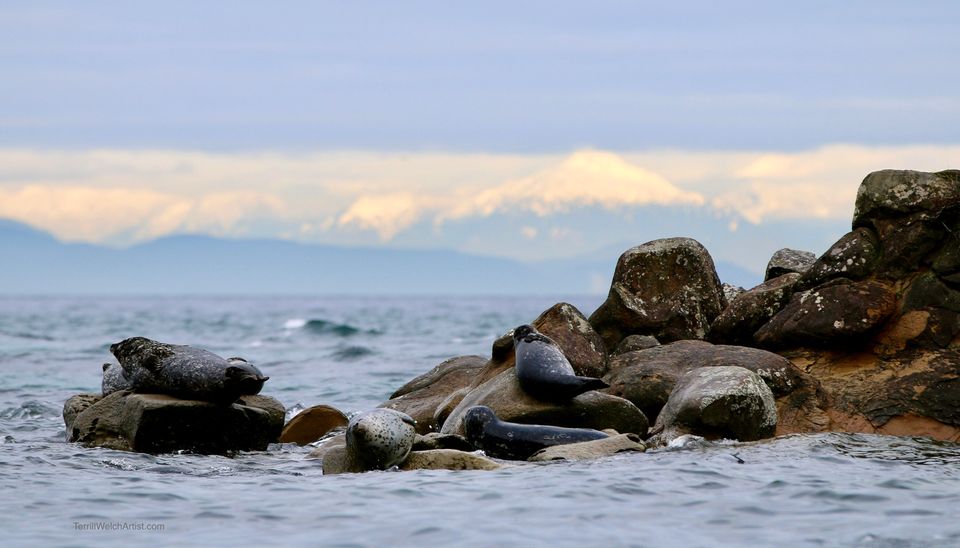
Daily routines are mostly soft and gentle even as we prepare for high winds and a potential power outage. There is a false sense that everyone is gone. This untruth seems to prevail only because the majority of people leave the island to the seals and otters during January and the first half of February. This climate is warm in the winter by Canadian standards. Cold is not the issue. It is the dreariness of it all that can get to people. Only the heartiest of hearty soles brave island life year round when its long dark nights are followed by the shortest of grey days, and heavy rains that are punctuated by King tides, winds and snowstorms. Those of us that choose to stay, watch for weather warnings, triple check our back up batteries and make sure our devices are always charged. Some people have generators and most have alternative sources for heat and ways to cook. We check in with each other and check in on the property of our neighbours who are away. If a person is prepared physically and mentally, it is not as difficult as it may at first seem. This is the quietest time of year on the island. It is a time of wool sweaters, waterproof footwear, fresh biscuits with homemade soups and longer than usual chats. Then, in a few more weeks this southwest coast of Canada will start sporting early signs of spring and our personal energy will begin to wake up to browse through the seed catalogues and make plans for the coming summer. At this point, full-time and part-time islanders who had left for warmer climates start trickling back on our more predictable ferries. But for these next few weeks, it is the coziest of cozy season and I plan to enjoy every hour of it!
We are now at the beginning of the Terrill Welch by herself paid subscription offering. If you missed the first Bonus issue published in December, you can read it at:
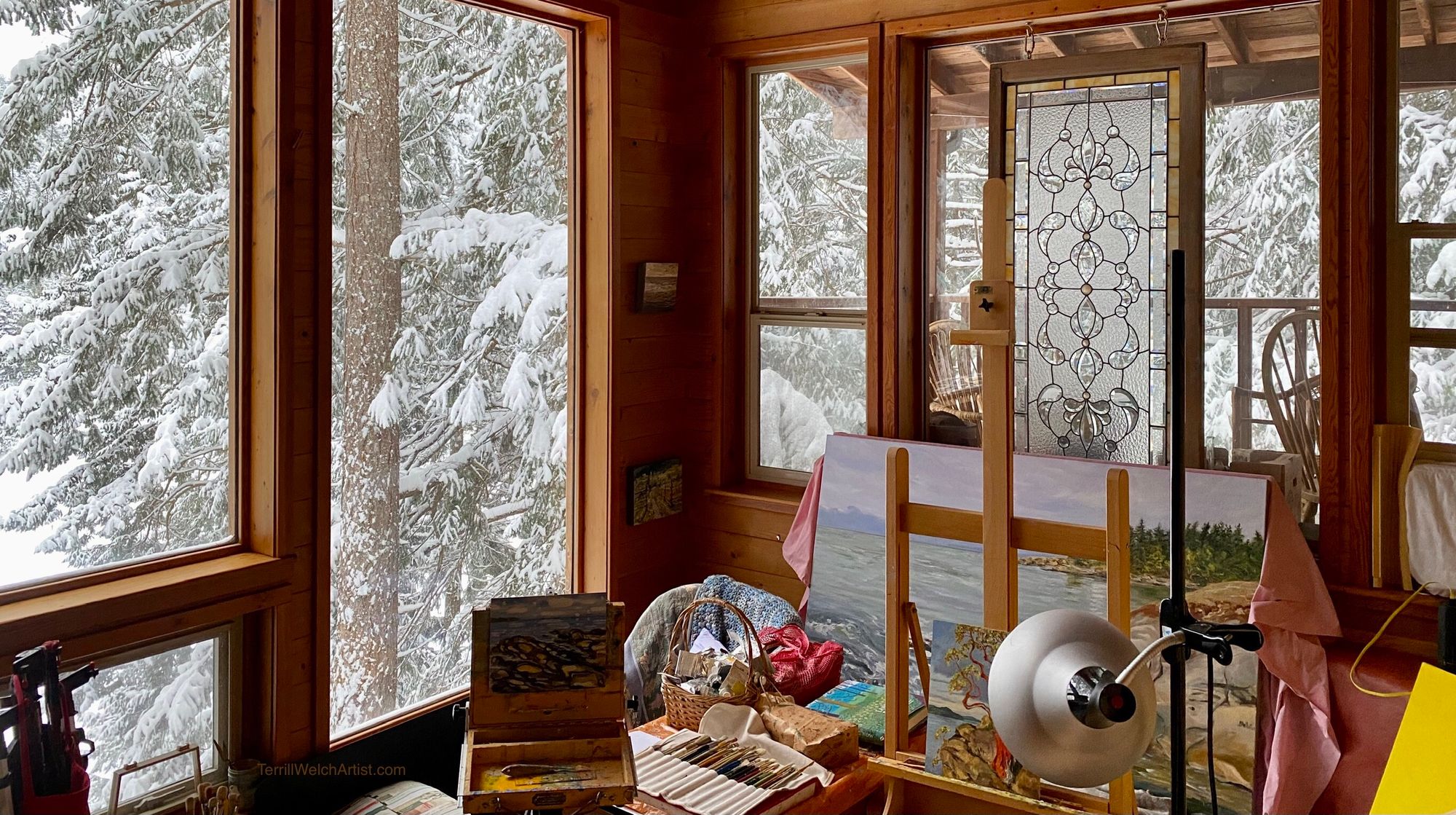
Just so you know, when you are browsing all of the issues I have published on the new platform, the ones that are only available to paid subscribers will have a little yellow star ⭐ after the title. You will always be able to read any of these along with all the “A Brush with Life” issues as well with your paid subscription access. Welcome everyone and thank you for joining me on this adventure! In the first Bonus issue, I promised you a hike with reference images so we shall start here this time with a few seaside adventures.
A GREY DAY ON SAINT JOHN POINT
Let's begin with few snippets from yesterday’s hike in Saint John Point Park on Mayne Island. The day wasn’t very promising and I almost didn’t go hiking. But once on the trails, it was pleasant enough with its pungent earthy dampness that is lightly laced with traces of wood smoke coming from nearby homes keeping their inhabitants cozy and dry.
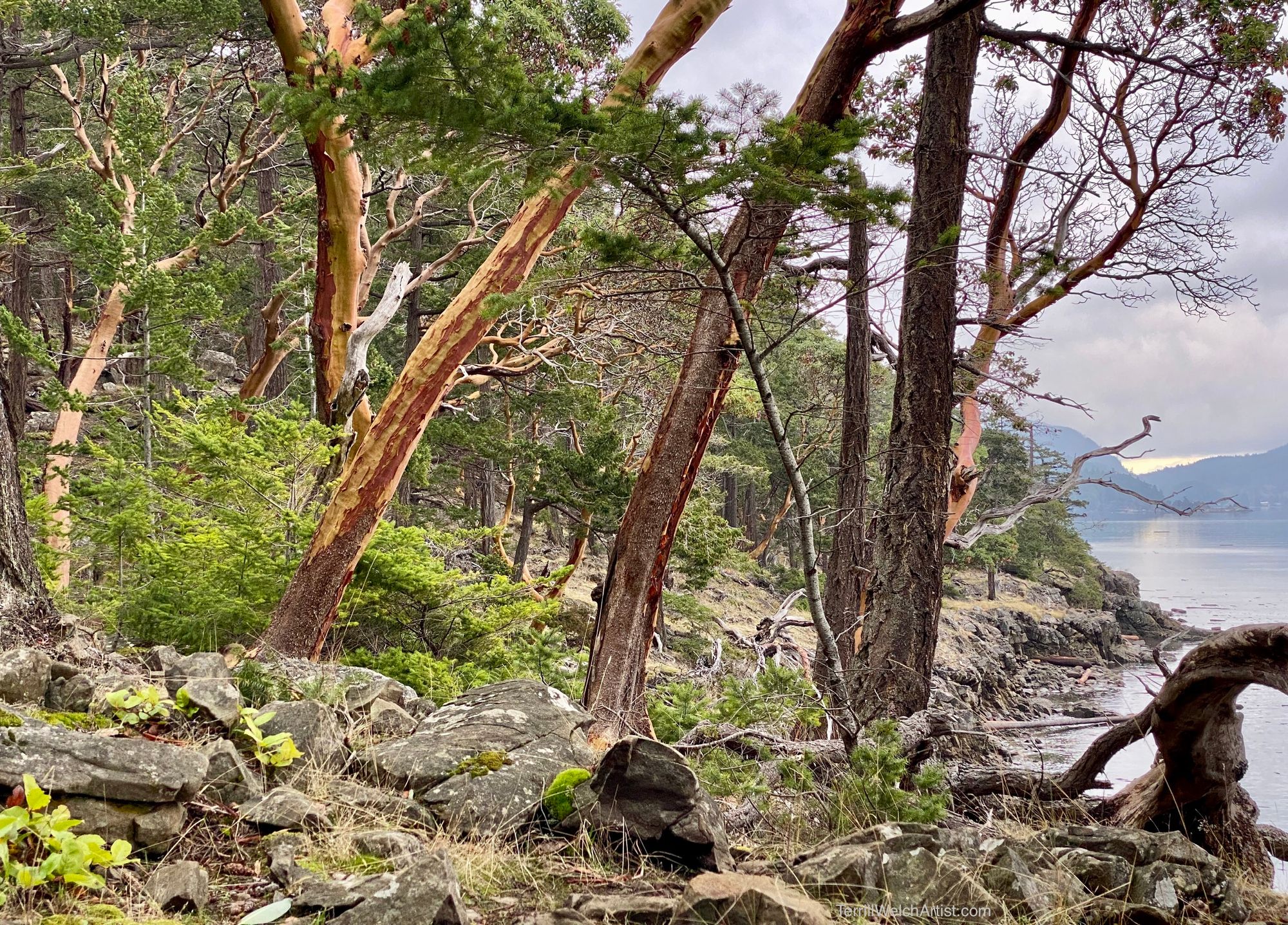
The low cliff bank on the right is topped by Arbutus and Fir trees with the trail weaving through them. There is a lot of driftwood due to recent high King tides along the shore. The day is blanketed in low clouds that are trying to lift and the temperature is about 8 degrees Celsius.
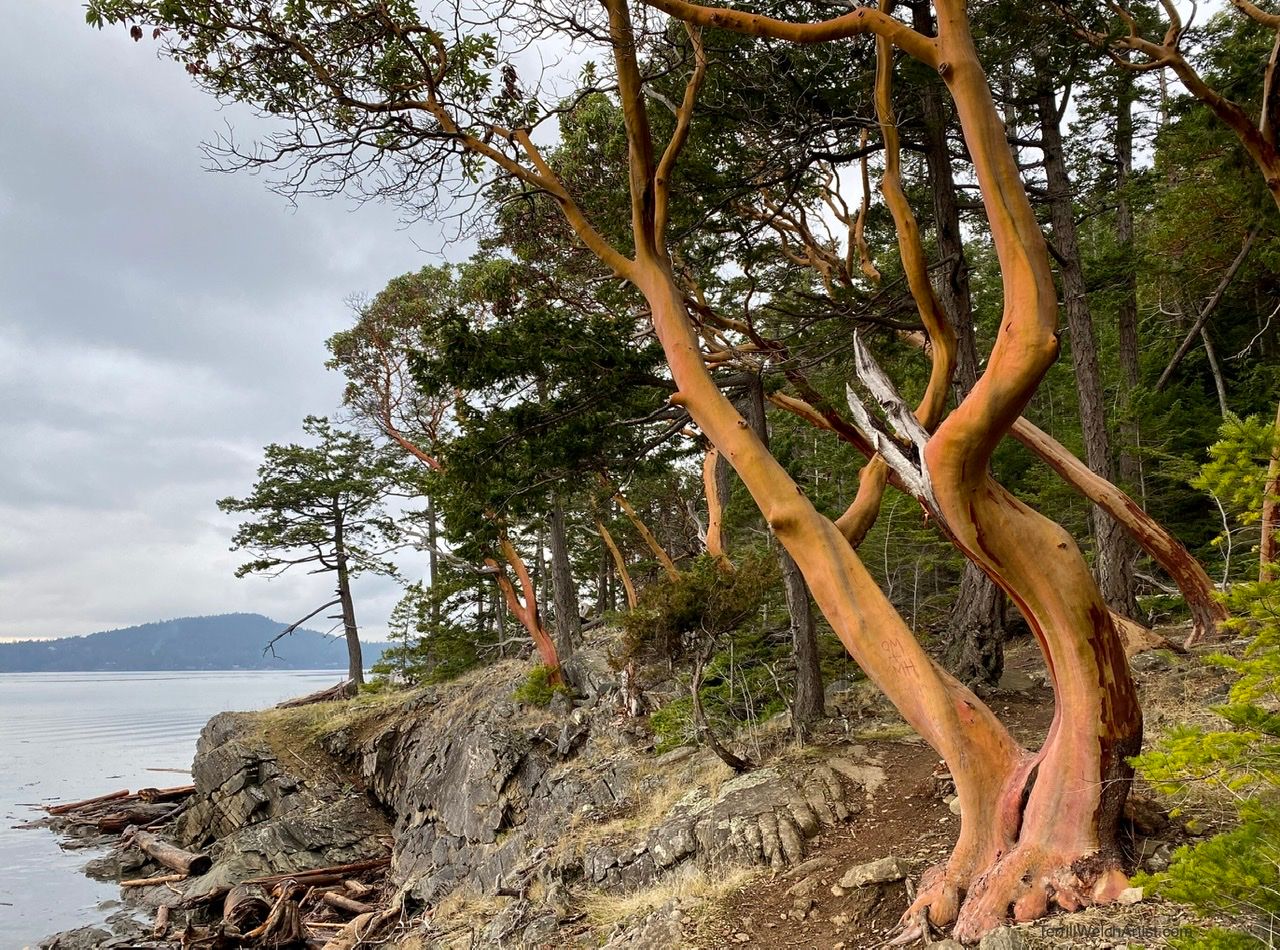
Facing south, there is a broken view of the sea in Navy Channel with Saturna Island behind. The day is heavily overcast with low cloud and light fog.
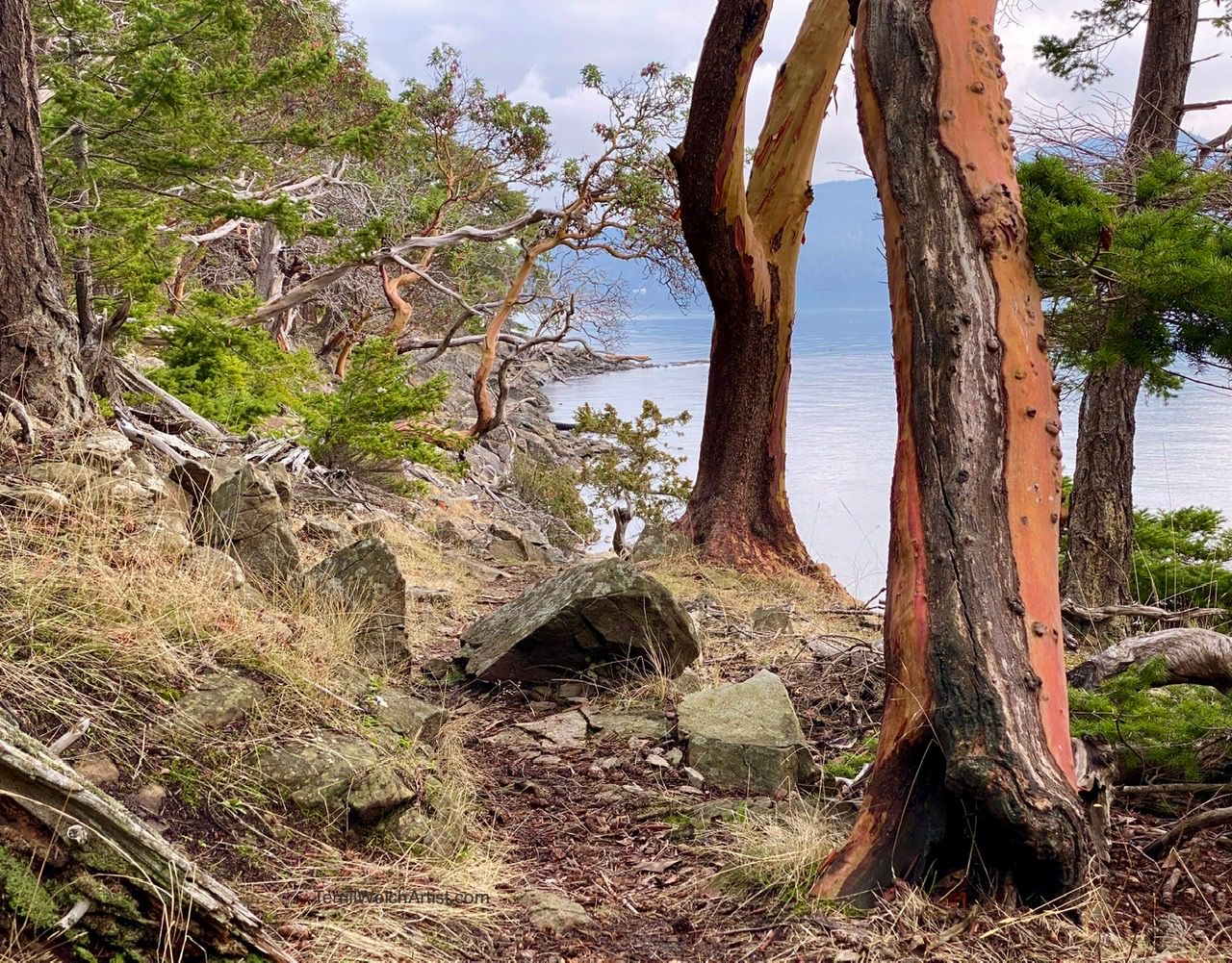
Arriving all the way out to the very point, I look across at Saturna Island. so close and yet farther than it looks if one has to arrange to take a ferry to get there.
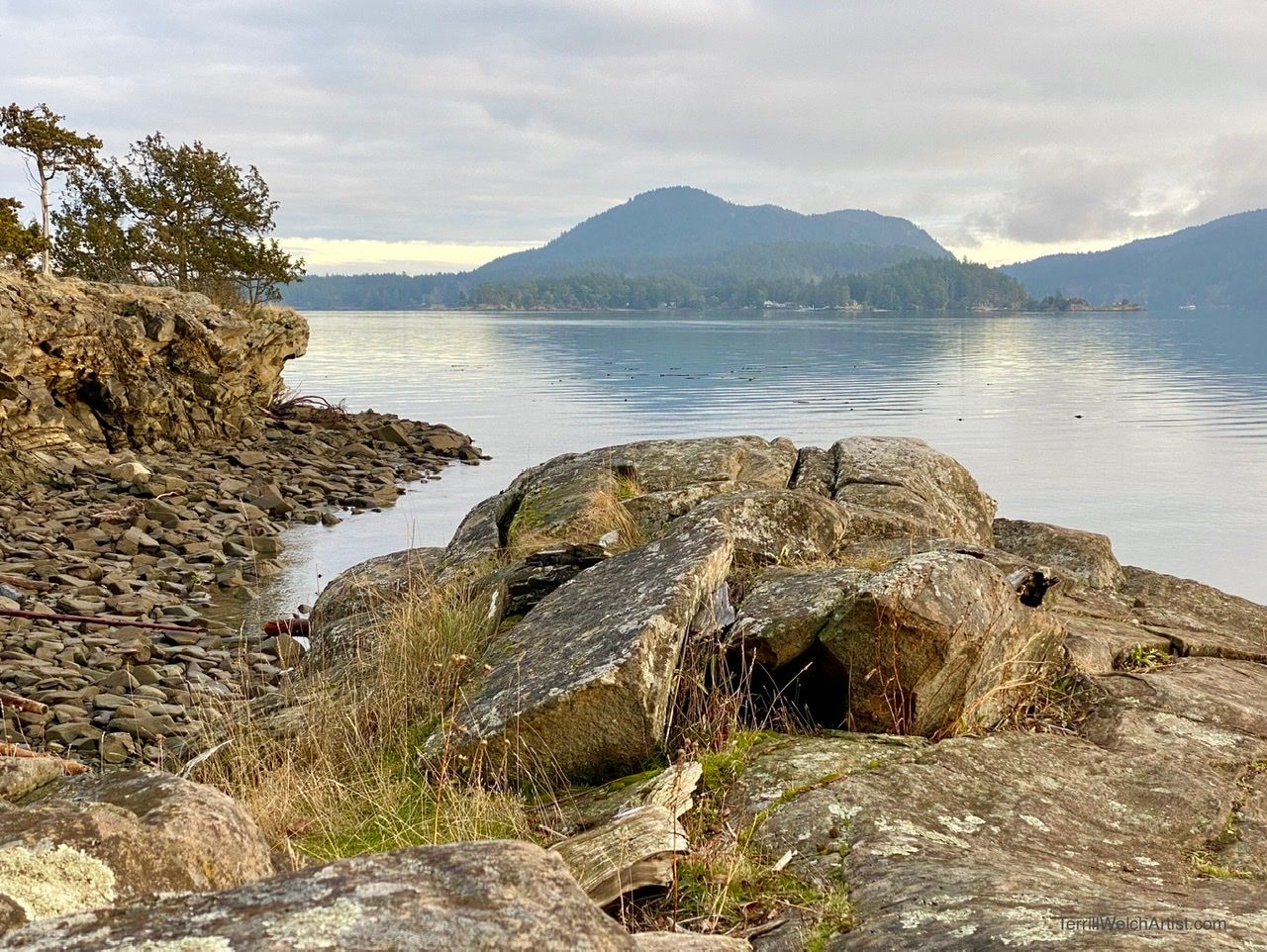
For a quiet Sunday, January 1, 2023, it is as good a start to the year as any. There is more in January though that continues to emphasize "Thriving In Place". Shall we continue?
ON A WINTER NIGHT
Sometimes there are magical moments without going anywhere. We just need to step out the door and listen to the sounds in the winter night. Make sure to turn up the volume...
MY PLACE IN IT
I crunch crisp toasted wildfire baked bread slathered in butter and strawberry rhubarb jam while sipping green cardamom and rose petal black tea with the bound cover of Braiding Sweetgrass by Robin Wall Kimmerer held firmly in my right hand. It is a flat pewter grey January afternoon. I have already been out along a seaside trail after bending and breathing my way through a morning online yoga session. My mind, body and spirit are relaxed and humming from the inside out. I turn the page to the third chapter - The Gift of Strawberries. After the first paragraph that introduces the idea of nature and place raising a person, Kimmerer mentions dewy wild strawberries and how they gave her a “sense of the world” and her “place in it.” I understand this notion in the deepest part of my being. I understand, as she tells how Evon Peter, living in a small village in northeastern Alaska, might say he was “raised by a river.” I understand why Robin Wall Kimmerer might say she was “raised by strawberries” in upstate New York. I understand this because I was raised by trees. And later by the sea.... because I am still growing up.
Yes, I had two loving parents who raised me. This is also true. But between farm chores and house chores and working away, there was plenty of time for trees to share in this task.
My learning from trees will come in handy for “Thriving in Place” such as in this new painting I am working on.
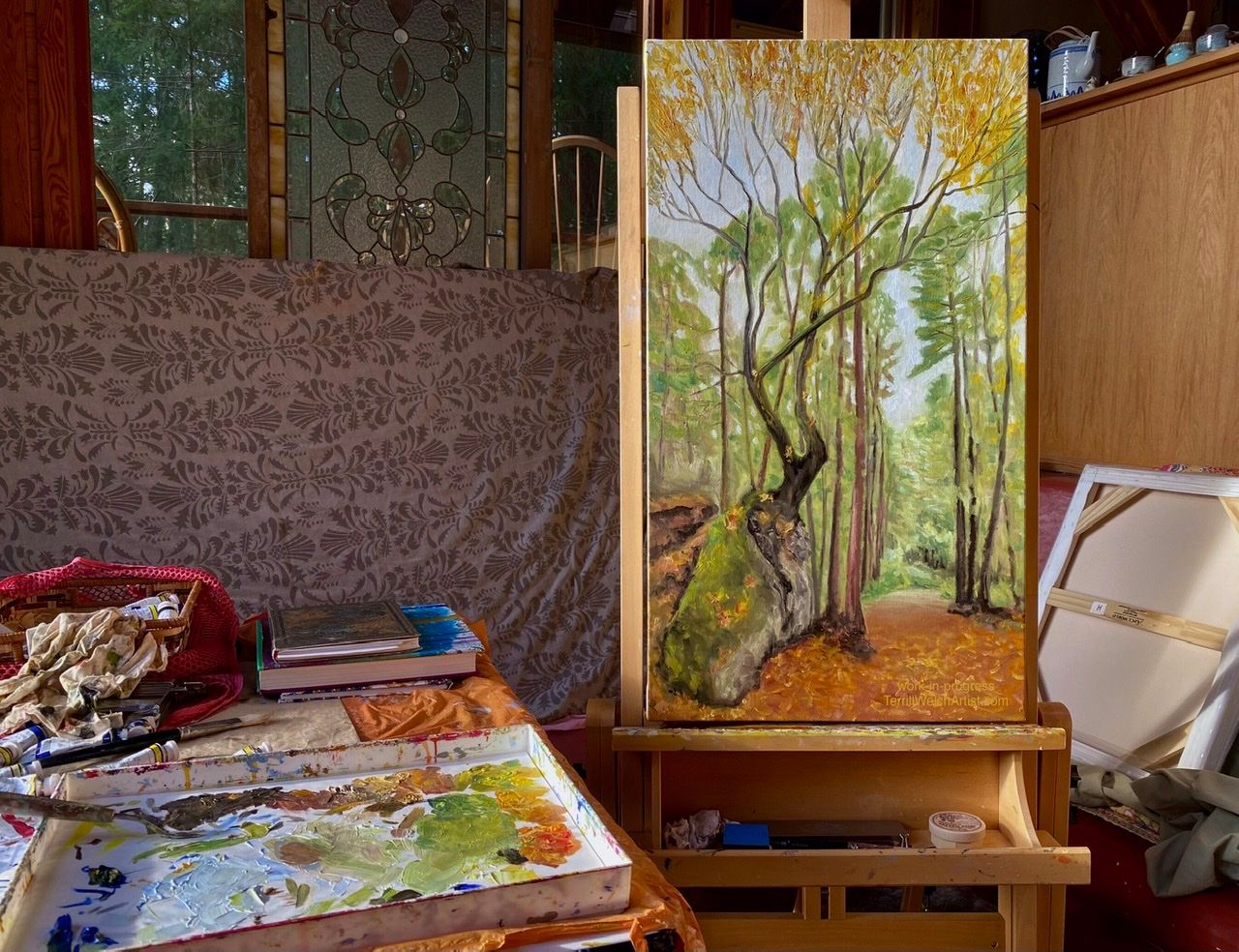
This gentle woman tree guards the trail, brushing me with her falling leaves as she lets go of the sky in November. She spirals around in mystifying swirls that allow her to perch on top of a large fallen conglomerate boulder. I cannot but wonder - how does she do it? Possibly the answer will reveal itself under my brushes.
In between painting days, I go to the sea at Oyster Bay. The seals shared in the lesson of “Thriving in Place” because this is their place in it and it is possible for us to experience their sense of the world.
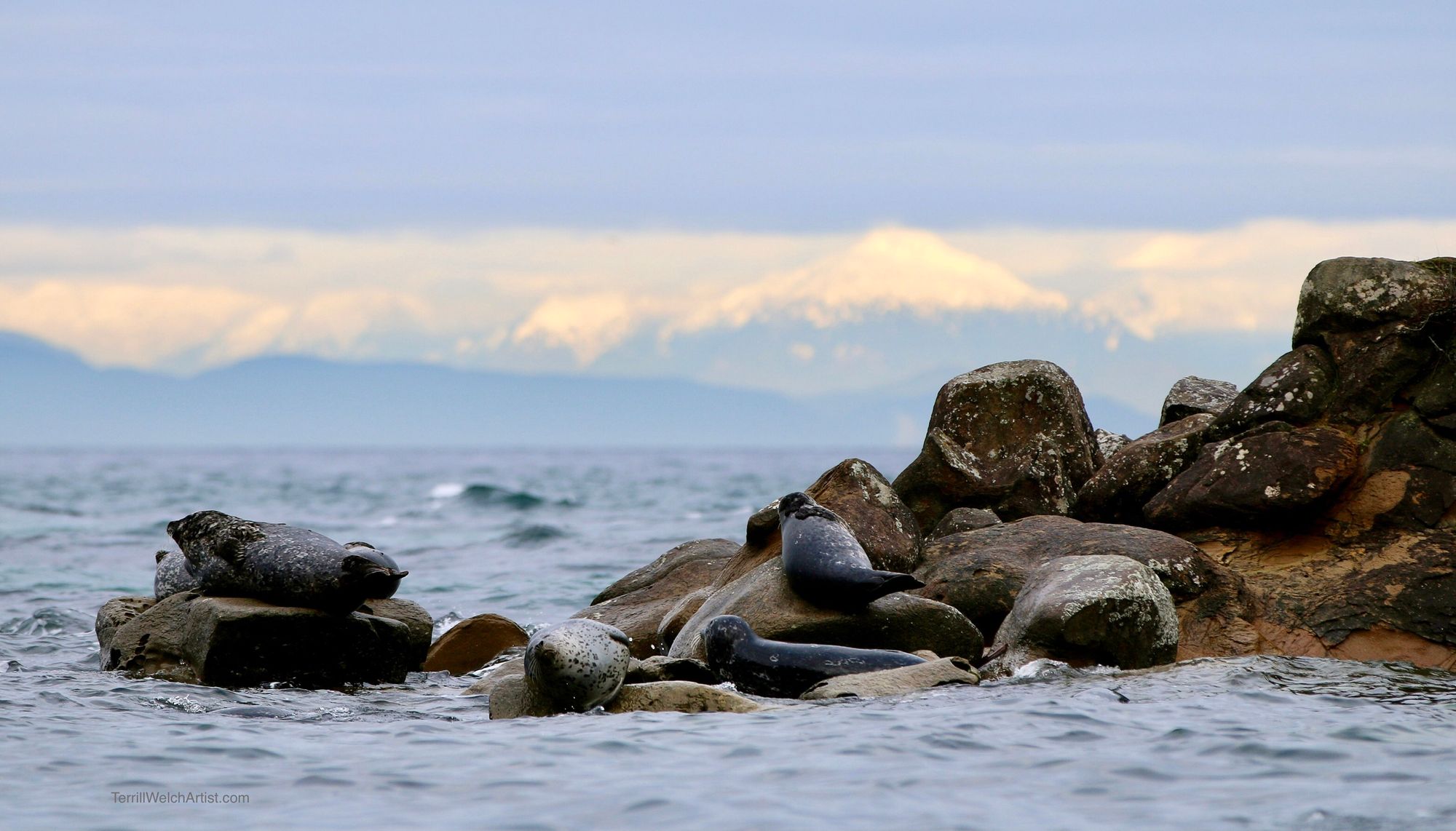
It is late morning and it has been raining for days so there is a nice clarity to the images that only comes after such weather. Seals teach us that it is possible to snooze anywhere and still smile about it.
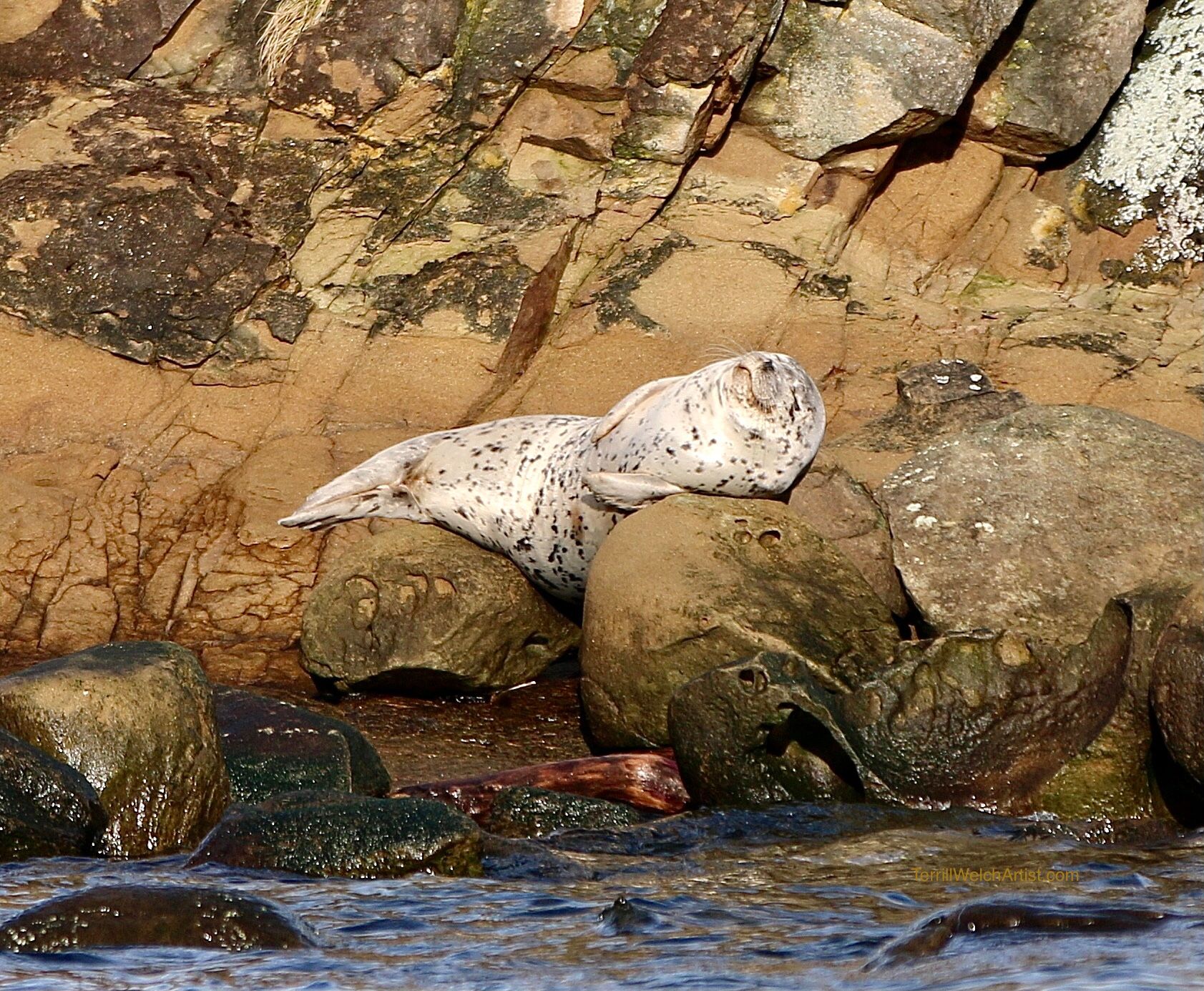
An eagle spreads its wings out to land on top of the sandstone above the watching seals below. There are hints of mountains in the background and the sea is relaxed in the foreground. If you could listen you would hear the grumbling of the seals and chatter from the seagulls high above as they have been hassling the eagle. There is a drama playing out here even though I am not too sure what it is about.
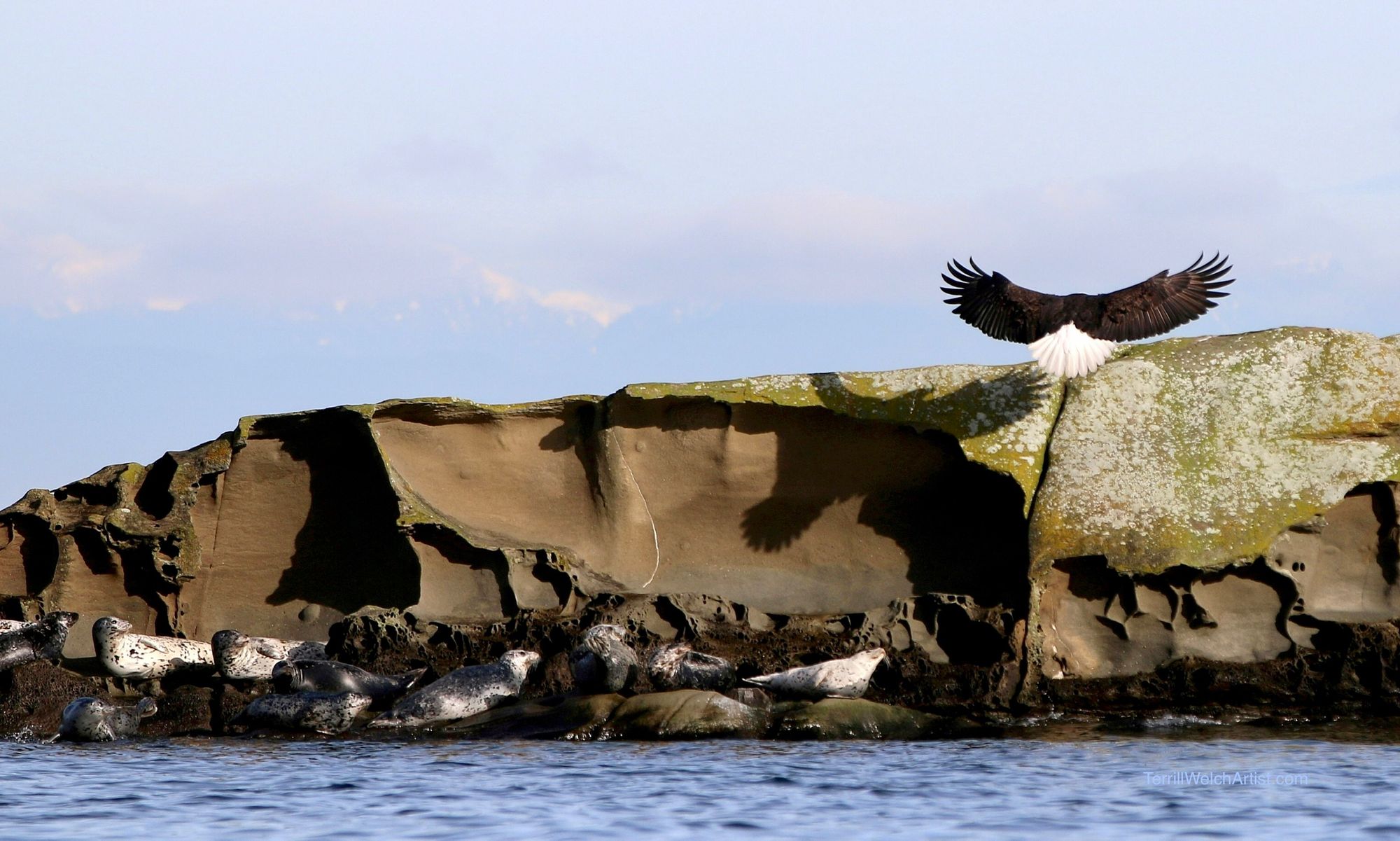
Thirteen seals sun themselves on a sandstone islet in a brief break in the winter clouds with a central one keeping guard. The seals are a variety of mottled greys, browns and whites that tend to blend into the sandstone rocks.
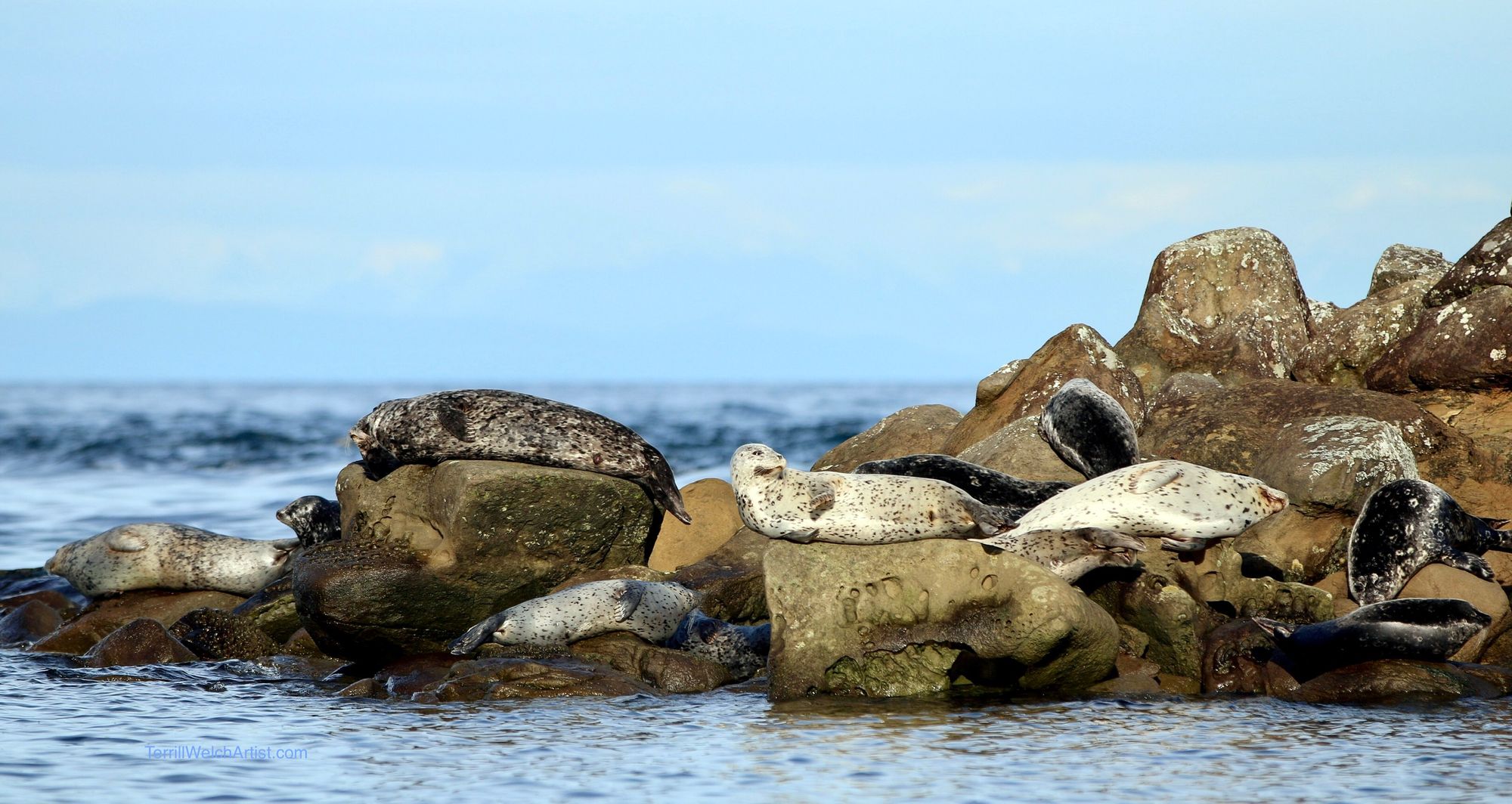
Some prefer to lounge on their own. This one seems to be saying - "this is my best side".
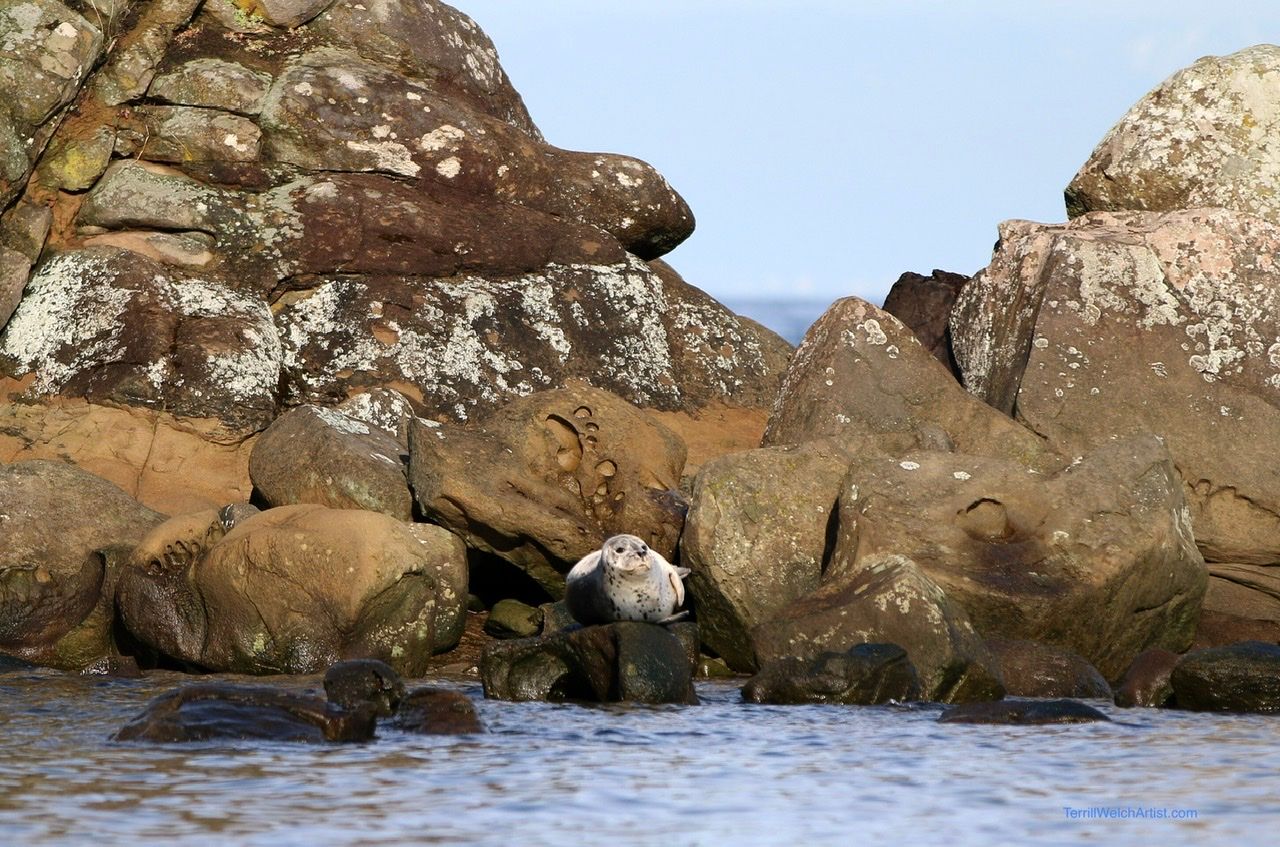
The next day at slightly different places on the Salish Sea shoreline, there are still more observations to warm my heart and still my mind. After a morning painting in the studio, I go down to the water for a bit. We are later than I like to be this time of year. But it is still lovely.
Mount Baker is catching the last of the afternoon sun.
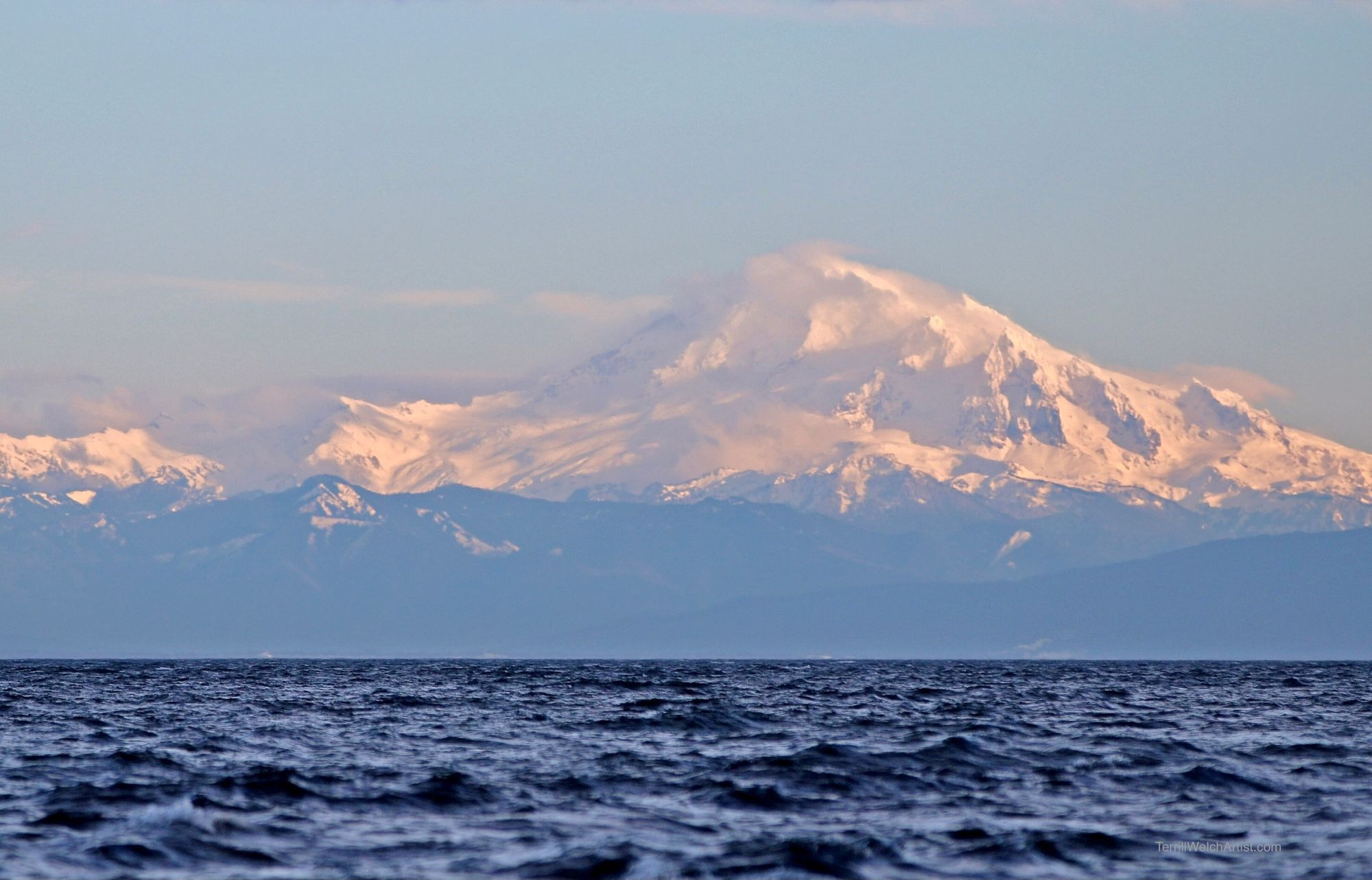
A large first year Glaucous-winged Gull sits on top of a sandstone rock. Its feathers remind me of the warmth of oatmeal with cream on top.
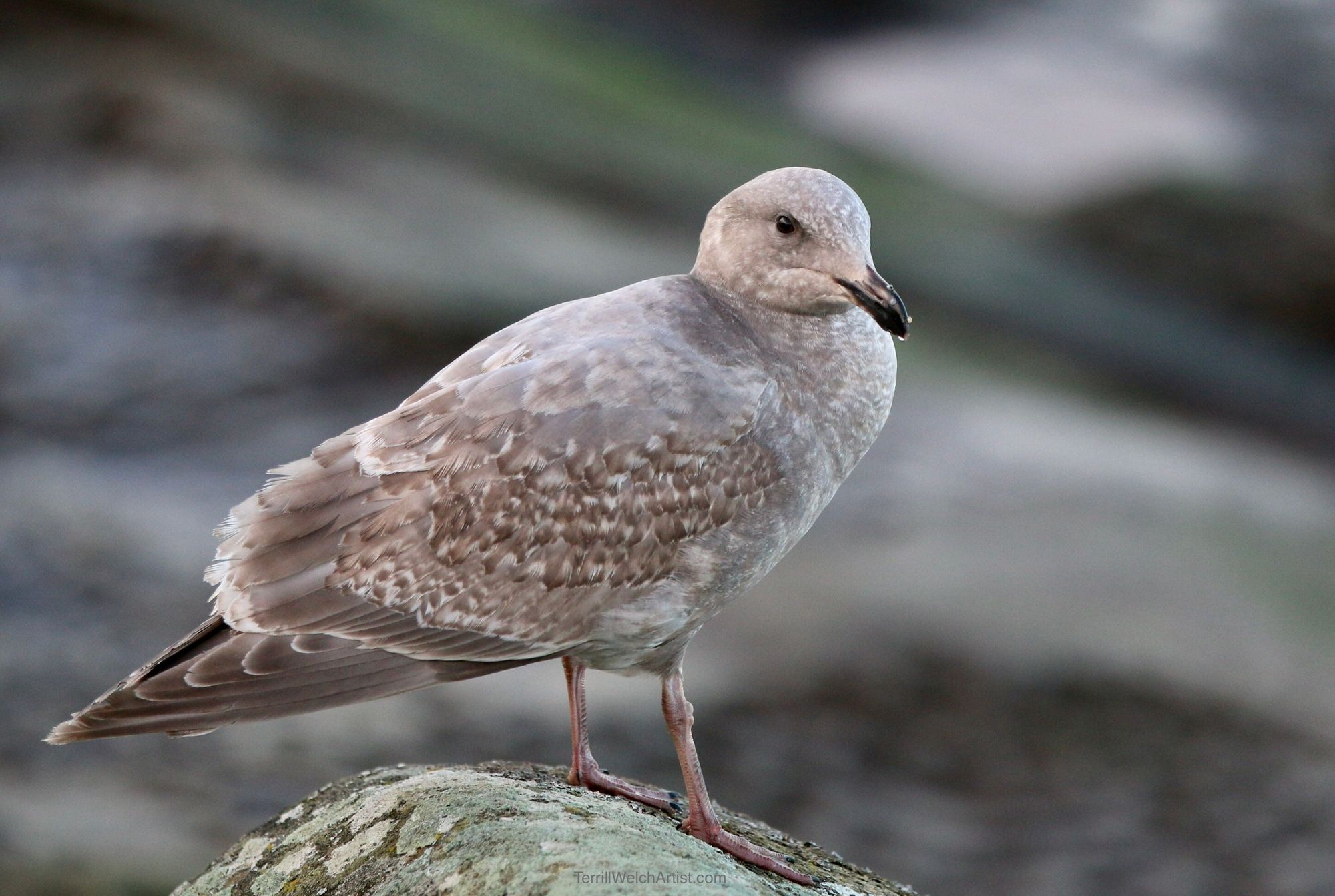
There are little soft suede brown Surfbirds with speckled bellies dipping in and out of the shore waters snacking on delights in the seaweed.
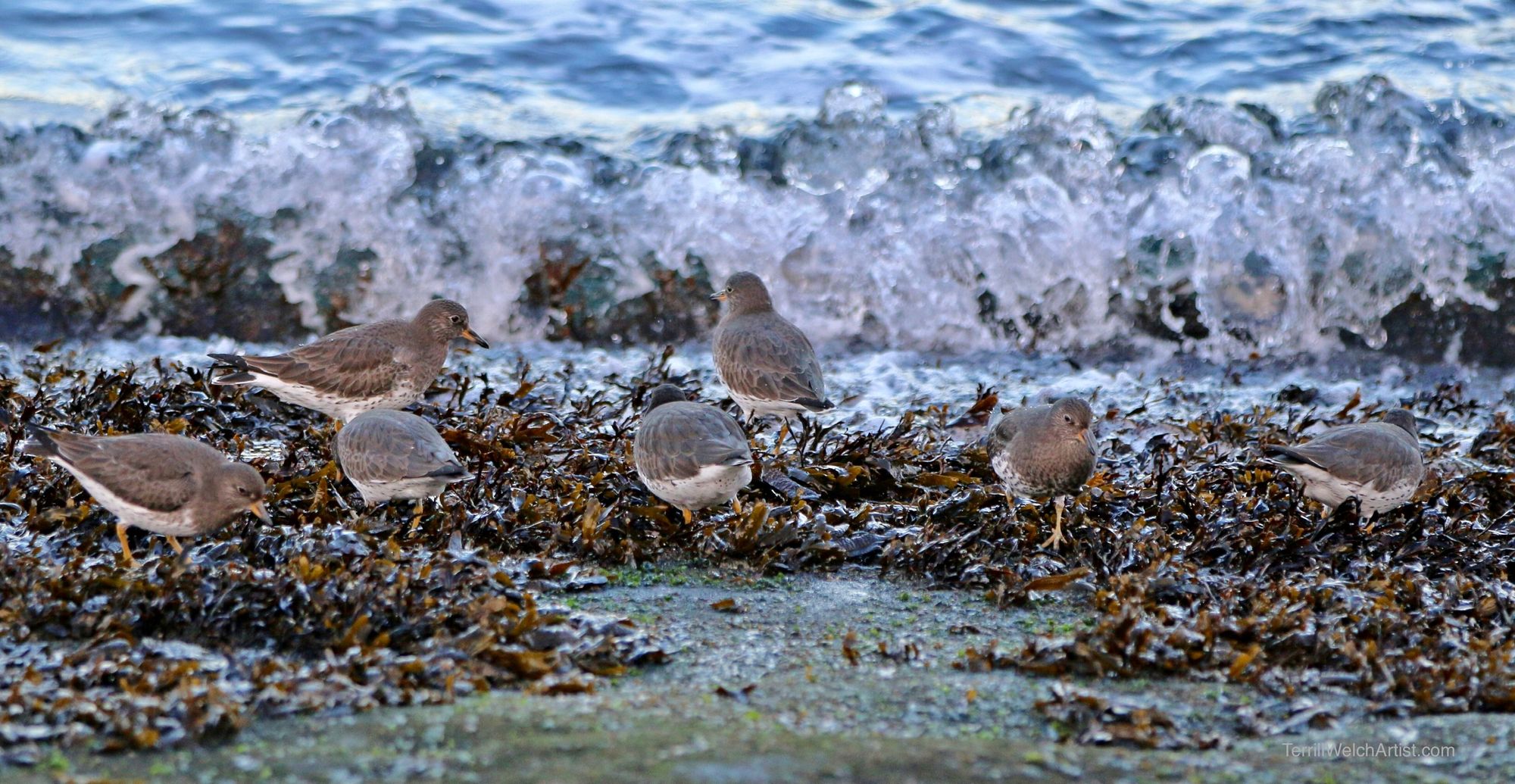
I leave the painting for another couple of days to dry before going back into it to finish. I now have work finished, photographed and the edges painted. The tree is on the old road behind our property that is now park land. I walk the old road often and this tree is good company along the way...
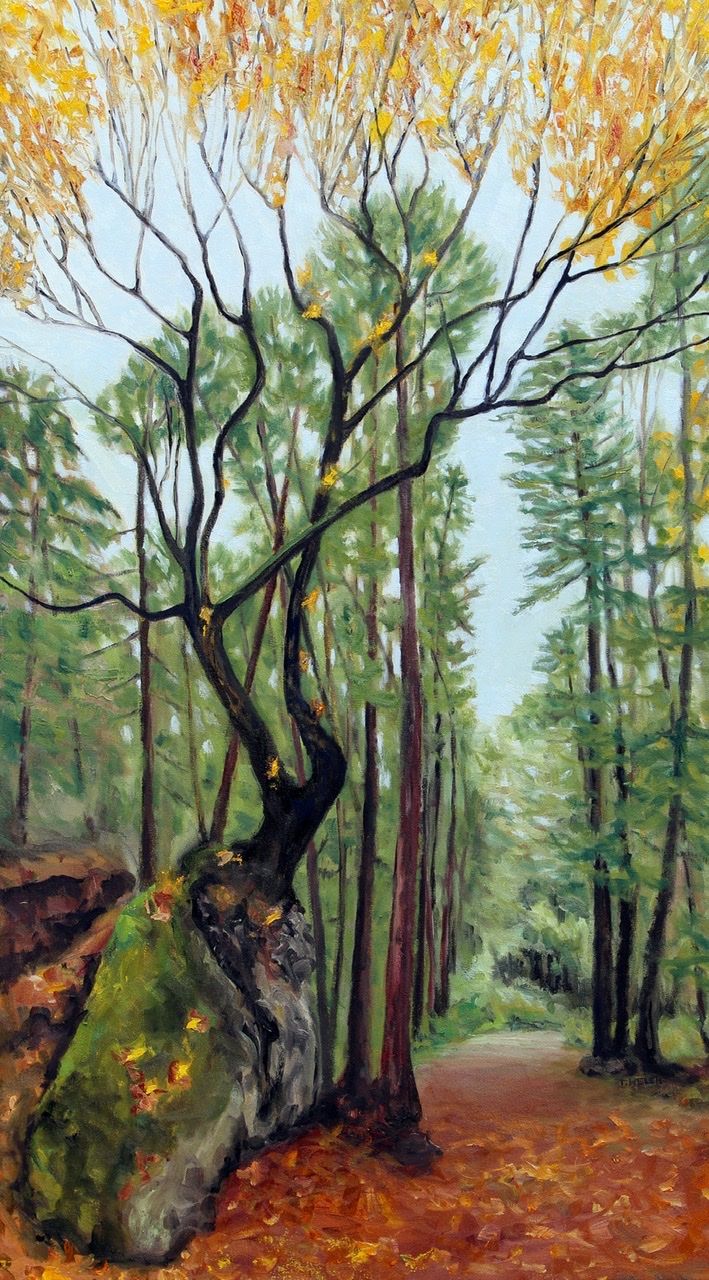
Here is the link to the private viewing room for the new "Thriving in Place" paintings and you will find this new work there with detail images and room views.

I will keep the listing private for just "Terrill Welch by herself" subscribers until next Friday. At that time, the painting will become publically available and featured in social media posts.
My “sense of the world” and my “place in it” are given back to me everyday as if in prayer. I, in turn, release this place, under my gaze and brushes, to be offered to others as if in prayer. Acknowledging, releasing again and again until the raw edges are as smooth as the stones tumbled by the sea. Temporary. My "place in it" is temporary. My “sense of the world” is that it is "for now" - within a notion of infinite folding motion. This is what the trees tell me as the wind passes between them. And the sea. I can hear fragments of these folds in the voices of the seals and gulls. It is good to be temporarily alive in this amazing temporary place. What magic!
Now for a story from the past before we close off this issue...
WHAT MIGHT IT MEAN TO BE POOR?
This of course is not the whole story. The whole story is too long for telling over only one winter. But it is a part of a story and a part that I feel might be worth telling.
Born in 1958, I grew up in rural Canada. My father was a logger and my mother a farmer until my father retired. Now in their mid 80's, my father farms and my mother is almost semi-retired. Growing up, we had a measurement for being poor that went something like -not having enough to eat, no winter coat, hat or mitts and not being able to go to the dentist to get your teeth fixed. My mother saw to it that all three of these aspects were covered.
So we were not poor.
If… the roof didn’t leak,
the water was potable (though carried in and out in a bucket),
the winter vegetables from the large summer garden didn’t freeze in the root-cellar,
the canning jars were filled in the pantry, and
the woodshed was stacked to the rafters with dry wood, then
all that was missing was a hind quarter of moose and we were fat and sassy until spring - or,
by our measure,
we were rich!
The library books were picked up once a month in the mail when we went to the nearest town for supplies. Stories were read at bedtime along with poetry and practicing our timetables. Planning ahead was a necessity. No matter your age it seemed, once you could walk, there were chores to do and everyone had to work together or we would all suffer. We had what we needed most of the time. However, true luxuries were few and considered frivolous. Wasting time or wasting money was mostly not an option. Still, it was also considered wise to purchase the best quality that one could afford and playing while working was encouraged. Laughing was free and there was no shortage of soap, so you might as well be clean while you are smiling. The more difficult the situation, the more likely it was that someone would find something humorous to make the burden a little lighter.
However, if you were to have a magic window and you were to look in on our family back then, you might have considered us poor,
with our outdoor privy,
no running water or electricity, and
hand-me-down, patched and worn clothes.
I just never felt poor....
Instead,
I had a very long wish list of optional “wants”.
Poor choices:
I finished high school while working part-time because I had already moved off the farm into an apartment with friends in town. I then left that small town for work and I went on to have my first child at 19 years old as a single parent. My second child was born when I was 22 years old. By then I was married. I later divorced - twice before I was 30. Only the marriages were poor choices. The children were two of my very best decisions. At the same time as raising my children, I worked. First in the service industry and then in the social justice field. I went to university. I was the first person to do so on either side of my family. I received a degree in Sociology with a minor in Women’s Studies over six years - while I went to school full-time and worked half-time with my two young children in their early years of school themselves. It was tough. No getting around that. But I was planning ahead. My children were pre-teens by the time I finished and we had made our way through the worst years of cash scarcity. We did it by using the same methods that had proven useful when I was a child. I taught them to work with me. As soon as they were able, and long before they were finished high school, they learned to cook full family meals, do their laundry, grocery shop for the highest nutritional value, on a budget. They learned to do their homework unsupervised and make their own lunches. They were not angels but understood that, if they got themselves into any trouble, they would have to call their own lawyer and then work to find a way to pay for legal services. Under these terms, it was much, much better to stay out of any serious situations. We had running hot and cold water, refrigeration, electricity and a roof that only leaked some of the time in the old manufactured home that I had purchased to give us secure housing. There was a wood stove for back up heat and the cupboards were “full of ingredients” as my son used to say - which meant that if you wanted something to eat you had to cook it... if there were no leftovers. We all worked hard and still found time to play together and with our respective friends. I wasn’t aways on my own during these years. I was sometimes in relationships with men, or sometimes women, but these partners usually didn’t last long and none shared the responsibility of raising my children. That was my job.
The third generation living away from the farm:
Today, my son, the eldest, finished all but one exam to get his high school diploma. He now works as a high end finishing carpenter and occasionally as a project manager on 10-15 million dollar homes.
My daughter went on to university and did a master’s degree in physics and teaches physics and math at a university.
My children are good solid human beings with strong values and inner moral compasses. I would be happy to have them in my life even if they weren’t my children. As a parent, I couldn't possibly wish for more.
Everyone is beyond "rich” by my childhood definition. Debt loads are manageable or non existent. However, values about money and time not being wasted still prevail. There is a pride in being able to tell the difference between a necessity and a want. Health and dental care and nutritious food are necessities. Refrigeration is a luxury but highly valued. Much better for keeping the beer cool than the back porch ;) Playing and enjoying what we do is just part of being fully alive.
What made the difference:
My parents still have the farm 43 km from the nearest town. They are 3 km from the main road up a long hill on a wider-than-it-use-to-be gravel road. The nearest neighbours are 6.4 km away. They still live without electricity and only have wood heat. By using propane appliances, they do now have running cold and hot water and refrigeration. There is also indoor plumbing and a landline telephone. No internet or cell coverage though. Mom packs her laptop up when she wants to use it and takes it to the library on one of their weekly trips to town for groceries and supplies. My parents are 85 and 86 years old. There are still over 30 head of cows to calve this spring and it is just the two of them and has been for many years. The vegetables are still grown in the garden and put in cold storage for the winter and berries picked for jam. The hind quarter of moose has become a side of beef that they grew themselves and it is cut and wrapped and stored in a deep freeze at my uncle's place about half way to town. The lessons they taught us are not something from the past. They are in the present. That can-do attitude for the pure pleasure of doing and taking pride in a job well done runs deep, along with a solid measure of stubborn pride. Yet, a little reluctantly, they are able to accept help when they need it and give it back just as quickly when it is required. But what else has been in our favour?
We are European settlers in a colonial society. We didn’t have to deal with racial prejudice or acts of genocide. Our family and small community was whole and thriving. We were not torn from our families and taken to residential schools. Yes, Canada has its own history to reconcile and that too needs addressing. We also lived and are living during relatively peaceful times in relation to outside threats in Canada. These things offer a solid foundation to notice and act on opportunities. They make a difference. Often, a huge difference.
Canada has universal healthcare which is a great equalizer when people have very little extra cash beyond what is required for basic survival. It is not perfect of course but it is a good start. Also, I remember my mother saying how important the government family allowance (now called the child tax credit) was to be able to get us what we needed for clothes and shoes. This was certainly true for me as well. These safety nets made a difference, particularly as a single parent.
There were some grants to go to university in the 1980’s when I went. In addition, I got a small student loan that I was able to pay back in eight years after I graduated. When my daughter went university I was making enough to help pay for part of her schooling while she worked part-time and also received bursaries, grants and took out a very small student loan in her final year. Plus, her master’s degree to study applied physics was free though she still had to cover her living expenses.
Though as a woman, there were still gender barriers, it was also the second wave of feminism. I had more support for what I needed to do to raise my children as a single parent than previous generations. There was a day care subsidy which made a big difference. By the time I was working in senior leadership positions in government, the wage gap within government was fairly narrow. It is not always so elsewhere.
Now, at 64 years old and working full-time as a landscape painter, by choice, purely for the love of doing it, I can think about what it was like to be poor at different times in my life. Did it affect my decision making and choices? At times yes, especially if it was a long stretch of not having quite enough. During these times, when something breaks and you have no way to replace it, that is when the hopelessness begins to overwhelm the grit that keeps a person going. It is when the kids are sick and you know that you only have three days that you can stay home with them before it will be difficult to pay the rent. This is when the numbness takes hold and fear settles in right next to your backbone (there were no paid sick days or family leave days yet then). These are the times, if I had been a drinking or smoking person, that I could see poor choices winning over common sense. These addictions can be a way of taking a time out. A break from the gruelling pressure of poverty. But these were not my vices or my escape. I was a walker and a person who loved the trails in the woods. I have always found my sense of balance and restored my inner well of hope in this way. This was my escape in childhood and in adulthood with my children and now on occasion with grandchildren. It is a foundational practice in my life and in my painting.
So when I reflect on the whole situation, I find that it is not just one thing but a unique combination of factors that came together during a specific time and geographical location that made the difference. Enough money alone wouldn’t likely have given the same results. Not in my life anyway. But it helps. A lot. What made the most difference was loving and being loved. This is followed by a personal satisfaction in a job well done and a deep desire for learning. No amount of money will help if you are poor in these essential aspects.
Well, enough of that! There is some more painting that needs to happen in this home studio and it isn’t going to paint itself…
UNTIL NEXT TIME
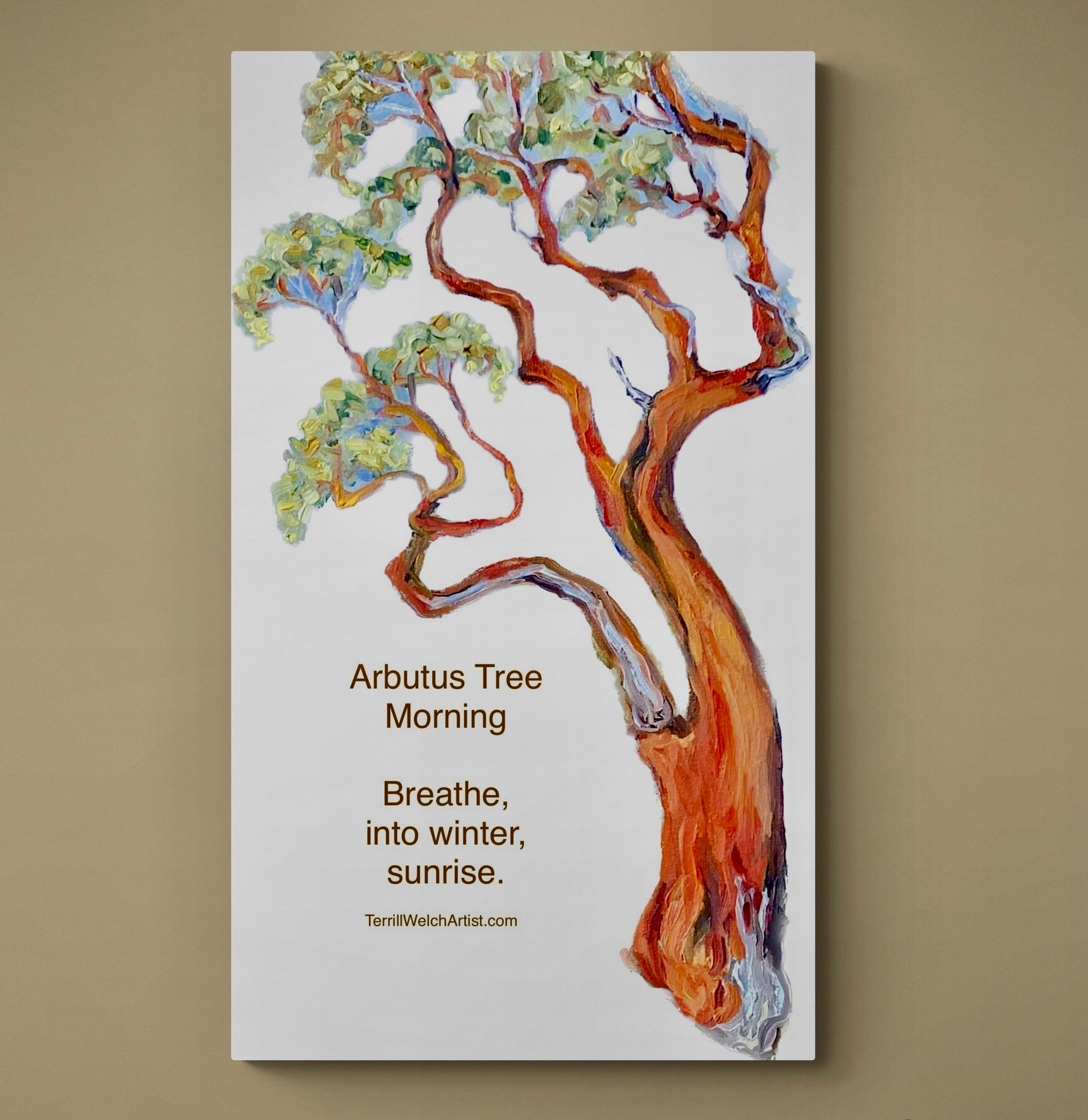
I do hope you have enjoyed these missives and adventures. I know I am enjoying writing more freely and in a more expanded way than I felt like was possible before. My screen time is down an average of two hours per day in a week with this change in my sharing practice and this includes the time I am spending writing. But it is more than just less time online. The online activities have changed as well. I spend more time reading longer articles and more time researching things that interest me. In the next issue, I hope to include a couple of new-to-me artists I have discovered. We shall see.
Thank you for keeping me company on this new journey. It is such a pleasure to have you along! This new platform is a little different. I discovered if you would like to comment, you will need to open up the issue online first. To do this, go to the top of your email and, under the title on the right, it says "VIEW ONLINE". Click this and it will open in your browser. Now, if you scroll to the very bottom you should be able to see where to leave a comment.
In addition, you are always welcome to write to me directly at tawelch@shaw.ca
Warm regards as always,
Terrill ❤ 🎨




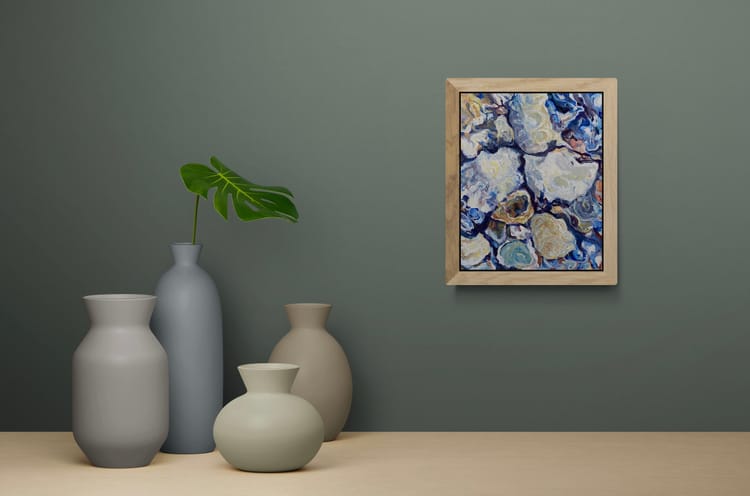
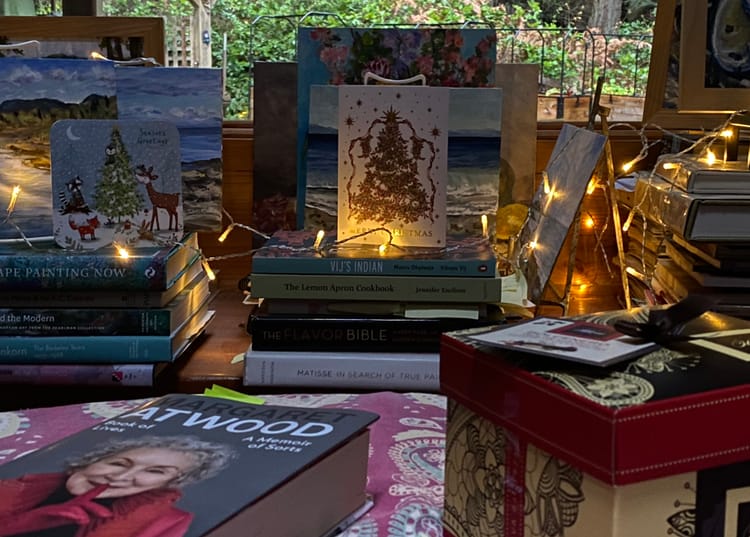
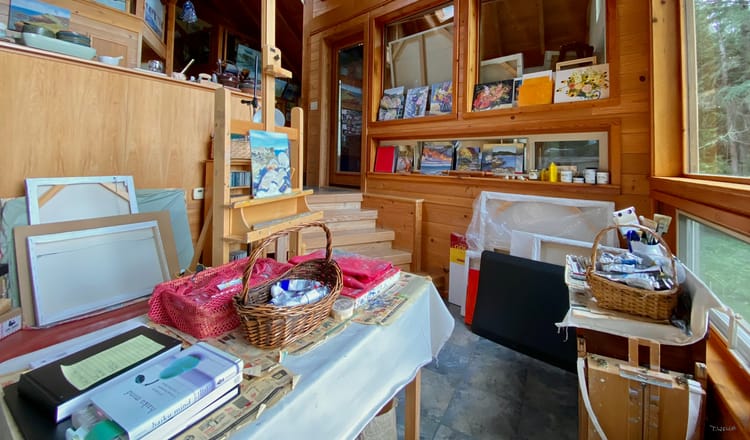
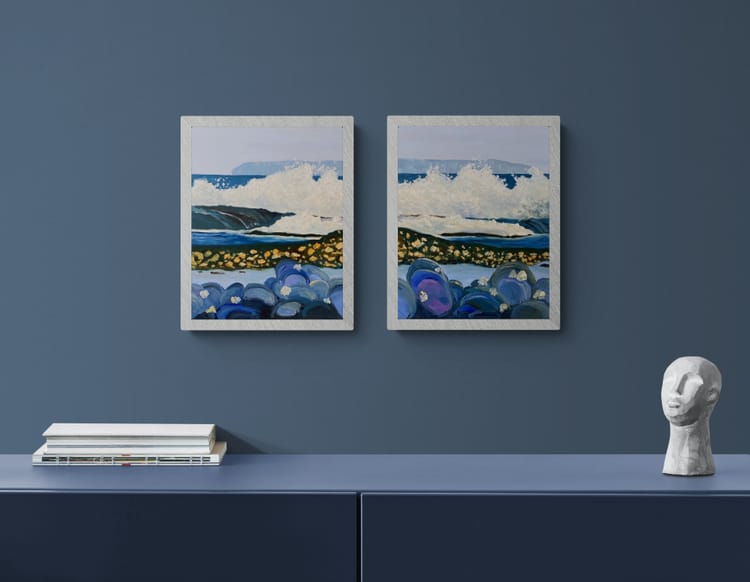
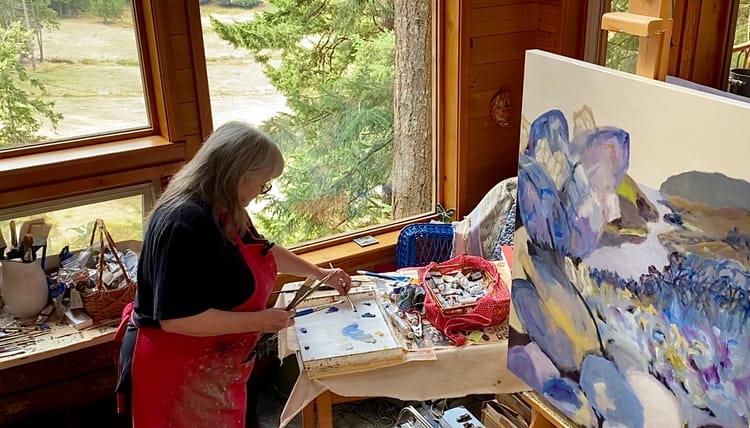
Member discussion